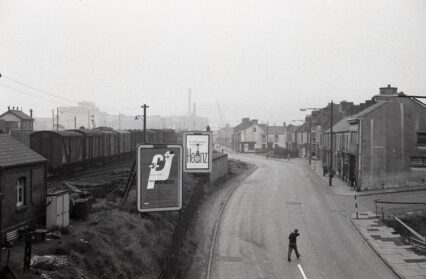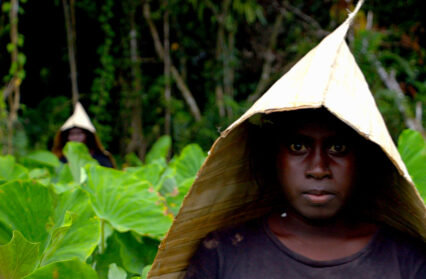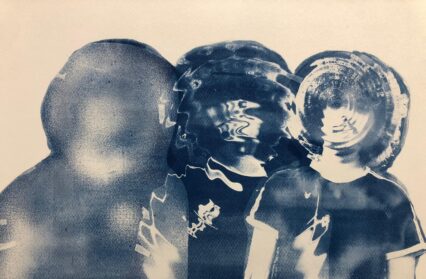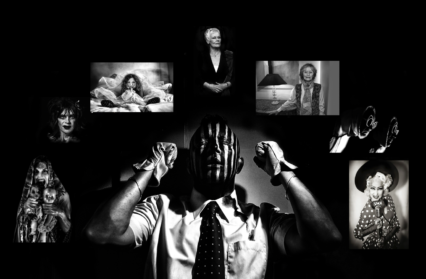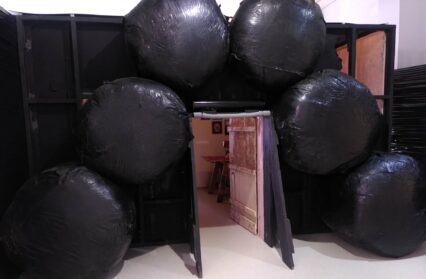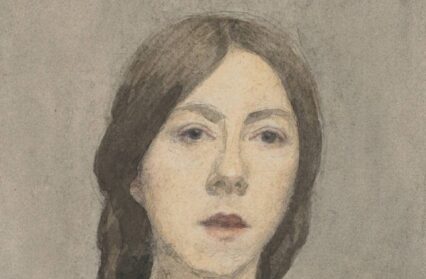At the age of 83 Molly Parkin has lived a life that positively bursts at the seams. Her tumultuous personal life and inimitable body of work are legend, yet the motivation and rationale behind her unique artistic and personal world view remain a lesser explored facet of her life. In this extensive two-part interview with Wales Arts Review the Pontycymmer-born auteur imparts the definitive take on her life and work.
The red brick World’s End housing estate sits incongruously at the tail end of Chelsea’s King’s Road; an imposing yet often unnoticed assemblage of towers only a short stroll from Vivienne Westwood’s distinctive clock-face storefront (formerly punk rock basecamp ‘Sex’) and the site of what was the self-styled ‘psychedelic boutique’ Granny Takes a Trip. Though not immune to the ravages of London’s monetary arms race, and existing as it does amongst the pastel fronted townhouses that radiate the unashamed urban opulence of SW3, the World’s End neighbourhood itself remains an apposite reminder of a city that once deigned to accommodate the notion of egalitarianism and the impulsive creativity of the bohemian lifestyle.
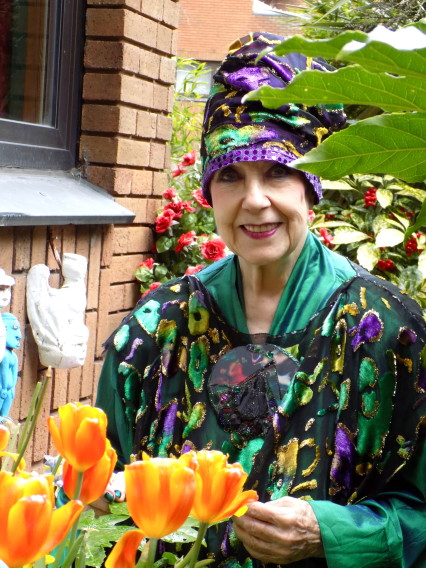
Though the homes that constitute the seven towers of its prominent estate seem wholly uniform in appearance, at least one of its flats appears determined to stand out from the crowd, to seek to somehow compete with the marvellous sartorial provocation of its dazzling 83 year-old resident who lives by the personal style credo that ‘whatever I put on has got to disturb what’s already there’. As we negotiate the spectacular foliage of her idyllic first floor garden, Molly Parkin reflects upon the convoluted circumstances that have led her to this place in the inspirationally candid manner in which she will do so over the course of our three meetings: ‘They put me here almost fifteen years ago when I became bankrupt,’ she recalls, the trace of her one-time 100-a day cigarette habit still faintly evident in her wickedly infectious laugh. ‘Bankrupt! Can you imagine? Quite possibly the greatest fear of anyone from the Welsh valleys, as you’ll know.’ Parkin, or ‘Moll’, as she is known to all who have ever had the pleasure of her scintillating company, lives a life entirely lacking in either self-pity or regret – ‘live a life without blemish,’ she advises me, memorably.
A life so full that it positively strains at the seams, its myriad travails having taken in characters of the magnitude of Louis Armstrong, Francis Bacon, Barbara Hulanicki, George Melly and Bo Diddley. Yet unlike the equally infamous Christine Keeler, who also found herself deposited in the World’s End estate during a period of personal turmoil, Moll views the last fifteen years as the most glorious and contented of her life.
Fresh from a successful and typically spirited exhibition at London’s Smokehouse Gallery – ‘Molly Parkin’s Playground’ – and a key role in Selfridge’s ‘Bright Old Things’ campaign, one in which Moll dressed the windows of the Oxford Street department store with her striking art, she typically reflects upon her good fortune at the expense of less contented times: ‘My time here has been a time of great happiness. My garden is like a godsend to me, instead of going to the top of a mountain I can just go out there and sit in my Mexican chair and I am on top of the mountain. I’m totally isolated and nothing gets in the way.’
The one thing that does ostensibly link both Keeler and Parkin, however, is straight society’s apparently perpetual desire to reprimand working-class women of no fixed deference for the perceived crime of seemingly having too much fun, a spiteful tax upon the people to whom Danny Baker attributes the term ‘the carefree crowd’. It is a theme that Moll rose to magnificently during her spirited 2011 performance on Desert Island Discs, her hackles raised by Kirsty Young at the depiction of her former personal excesses as ‘debauched’: ‘It’s a word that has critical overtones. Hedonism is a rejoicing in life whereas debauchery suggests you’ve gone down the wrong passage – and I never think any passage is the wrong passage.’ Yet to many it is this past, these stories, those lovers, that constitute the public persona of this inimitable spirit whose impulses and values were forged in the small South Wales valley town of Pontycymmer; an artist, a writer, a hugely influential fashionista, a socialite whose lust for life and liquor made her the toast of both The Colony Room and the former colonies, yet a woman once deliciously damned by the priggishly provincial Garw Gazette as ‘a disgrace to the valley’.
As we meander past the Frida Kahlo-inspired kitchen and through her vivid pink living area, a riotous explosion of colour, life, and ethnic nonconformity, she gestures at one of the many canvases that adorn almost all of the available wall space, her art still as crucial to her sense of purpose and well-being as it was when she first picked up a paintbrush as a child in the South Wales valleys.
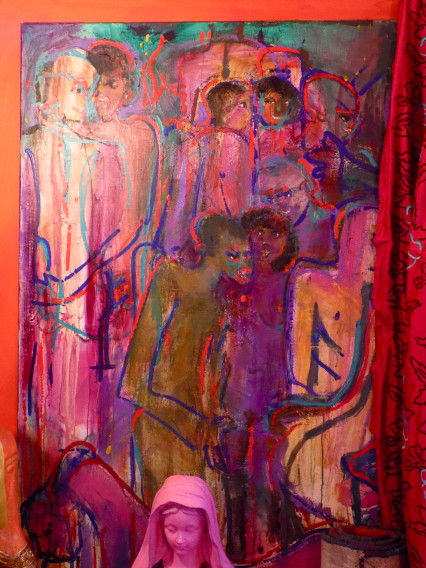
‘Just Another Orgy’ is an unapologetic representation of the marathon group sex events that she and the equally notorious Anita Pallenberg would routinely orchestrate at New York’s infamous Chelsea Hotel, Moll brandishing a cane and a cigarette in the inimitable style of the most demanding Hollywood director. It is one of the few moments when I ever pause to contemplate the reality of Moll’s 83 years, her uninterrupted vivacity, radiant skin, and animal print brothel creepers rendering all consideration of age utterly redundant: ‘This one here had a really big cock,’ she laughs, gesturing at a visibly inconsistent detail at the painting’s centre; ‘but I had to get rid of it. The warden who pops by is very religious and I didn’t want to cause offence to her.’
Moll’s consistently candid disclosures, her refusal to indulge in artifice, form the bedrock of a woman determined to stay true to herself: ‘I was asked a question on BBC radio just the other day about whether I had anyone in my life at the moment and a friend questioned why such a personal question had been asked of me. So I told them that it was exactly what I used to do when I was an interviewer for The Sunday Times. I’d say, “so now we get onto your personal life”, and they’d always say, “I don’t want to talk about that”, and I’d tell them that it wasn’t for them to decide. I’d tell them “you’re a public personality and this is what people are really interested in”, and I’d always succeed in teasing it out of them,’ she smiles; ‘…kindly’. ‘I should never have got married in the first place,’ she reflects, (her two marriages, to art dealer Michael Parkin and painter Patrick Hughes having ended in divorce). ‘Some people are just not cut out to be married, especially people who are painters or writers. That is their companion. That is the thing that’s closest to them, and that’s their reason for living. That’s why I was dying slowly inside and drinking myself to death as a fashion editor because I wasn’t surrounded by kindred spirits as I had been before; poets, artists and the like.
Fashion is an ugly, ugly world, breaking hearts and leading girls onto those stringent diets. It’s utterly neurotic and all about the surface of things, money and sales’. Her hugely successful role as fashion editor for the trailblazing and innovative magazine Nova was followed by a turbulent and short-lived period at Harpers & Queen during which she actively sought to get sacked after clashing with a seemingly intransigent editorial board – ‘awful people, all Tory’ – about her single-minded artistic vision and refusal to kowtow to the magazine’s apparent obsession with creating a product for a long-since obsolete audience of 1950s housewives.
Moll confides in me that one of her greatest regrets was not ‘marrying Welsh’, and about a potentially devilish matrimonial union that almost came to pass: ‘Oh, poor Steve,’ she ruminates about the memory of the recently deceased Visage frontman and son of Newbridge, Steve Strange. ‘I’d just come back from living in New York with my second husband, the marriage was over and me and the girls (daughters Sophie and Sarah) went to live at the Rolling Stones’ house at Cheyne Walk. George Melly and I started an affair – he gave me a dose after a party – while I was in a relationship with Tony Shaffer (writer of The Wicker Man). My weekly parties were legendary. They were even in Harpers & Queen as the place to be each Saturday – ‘Molly’s Place’. We used to host huge parties and Steve was always there, cosy like, a Welsh boy, Marc Almond too. In fact, Marc, who was a good friend of Sophie’s, lived in our basement flat at one point when he first moved to London. Steve asked me to marry him once, at Langan’s restaurant in Mayfair, where we always used to go. Steve was with George and I and we were celebrating my divorce. “Moll,” he said, “why don’t we get engaged? We get on like a house on fire, don’t we?” So I asked, “What do you think, gang?” and everyone thought that it sounded like a good idea. So I chose one of the rings from his finger and he gave it to me. But then he went with the drugs, the hard drugs, and that wasn’t my scene at all. Anyway, I told him that I was old enough to be his mother, and even though he said he couldn’t give a fuck he was rightly concerned about what the reaction of his fans might be. It was only just for fun.’
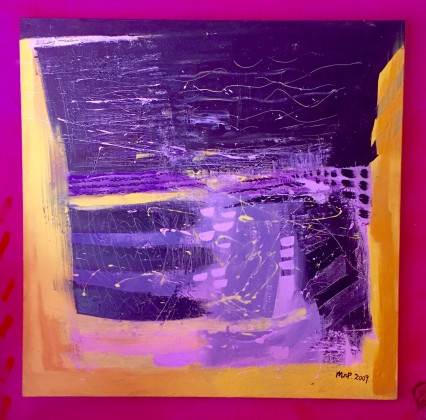
The remarkable chaotic turmoil of ‘Tsunami’ dominates the entirety of the wall space above the artist’s bed. Aside from being a wonderful example of the manner in which Moll attacks a canvas, it also exists as a post-Katrina love letter created in the wake of a cultural pilgrimage to Nashville and New Orleans undertaken by Moll and her sister, Sal; a journey inspired by Moll’s initial sensual and sexual awakening by the fabled jazz musician, Louis Armstrong. ‘Oh, he was the one who started it all! I was 22 and wearing a cotton frock but I was already doing all that around my eyes and I had a lot of black hair. I came to London from Wales to study and I was also teaching under-privileged kids in Elephant and Castle. I didn’t drink at all then. I was a model pupil, always painting and drawing, but my friend Betty and I used to go to The Studio Club just off Piccadilly, a basement jazz club, because we loved to dance. I was non-stop at the time, sleep didn’t mean much to me. One of the musicians, a pianist, was from Neath and he said, “Moll, you’re full of beans, but if you want to have a perfect life you must come to see this guy called Louis Armstrong, he’s a black jazz singer, and he will change your life. It will teach you how to live, Moll, because he has such joy, and that’s what I want for you.” But the tickets were £12, which was a huge amount in the 1950s. Then one night I was approached by a guy in the club – a toff, a foreign toff – who told me how much he admired my art. He had aspirations to be an artist, he’d taken a studio in Chelsea and he asked if I’d teach him to paint twice a week. So I told him that it would easily cost him £10 an hour, which was a huge amount then, about ten times the going rate, but he agreed to it. And so I got to go and see Louis Armstrong and also got something new to wear from C&A! And afterwards, Dyl Jones, the guy from Neath, introduced me to him and I was so absolutely blown away by the music – because I was only brought up in the chapel with my own mother playing the organ – and Sal and I used to go dancing but it was just dance hall music, and this was proper dance music, jazz, and my heart turned over. And so I had this little cotton frock on and I didn’t have any lipstick or make-up on, just…’ she laughs, gesturing at her elaborate jewellery, ‘all this tangle. He took one look, and just drew me to him, and he whispered in my ear, “You’re mine for the night, honey.” I was shocked, I drew back, I was still a virgin, and I said, “I’m very sorry, but that’s just not possible because I have to get up early in the morning to teach my girls in the Elephant and Castle.” And he was astonished. I don’t think he’d ever been turned down for a start, even given such a ridiculous excuse! So I told him, “In any case, I’m a virgin,” and he just drew me to him and kissed me.’ She laughs at the memory: ‘And that mouth was taking in my nose and my chin, the whole lot! I knew I’d been kissed, and nobody had given me a carnal kiss like that before, with a tongue and everything. And then everything inside me came to life; what had not been there before. He gave me a life-force, and what Dyl had predicted came true.’ She pauses, ‘…He taught me how to live. I was so shocked, and though I turned and ran away from him, it was to be a turning point in my life. I was traumatised by it, but at the same time floating on air, and I went home thinking, “Oh my god, there’s so much out there on offer that I don’t know anything about.” And so within a week, and because I now had money from this toff who wanted to become an artist, I went to Galeries LaFayette with the intention of buying some heady sexy perfume to replace the lavender water which simply didn’t go with this new turbulent feeling. I ended up being served by this awful bloody snooty Parisian woman who refused to believe that I could afford such things, but from that point on the scent of Tresor perfume always gave me the same sense of arousal that Louis’ kiss had first given me.’
Within a fortnight of ‘the kiss’, Moll had given her virginity ‘like a huge bowl of cherries’ to the esteemed Scottish character actor James Robertson Justice. ‘Oh, now he was the boy,’ she smiles broadly at the memory of the man who still stands out as the true love of her life. ‘He took me for dinner to The Ivy, again in the same little cotton frock, and he had his hand in my knickers all the way through. He was besotted with me immediately. He introduced me to everyone in London, society people, the aristocracy; and I enjoy the company of both the aristocracy and the working class. It’s those in between, the middle class, that fuck it all up for everyone.’ Yet it took a Scotsman to introduce Moll to the poetry of Dylan Thomas, a writer who would soon die in the same New York hotel that would later act as the setting of her aforementioned orgies. ‘I wasn’t that widely read at that point, but James introduced me to Under Milk Wood and advised me to stick with poetry and pornography through all my life, saying, “that’s best, Moll, for you.”‘ She laughs at the memory, and the irony of her subsequently becoming a much-read erotic novelist: ‘Which actually ended up being really good advice.’ She adds, ‘I once considered having elocution lessons to tone down my Welsh accent,’ – this coming at a time just before the notion of ‘swinging London’, and the ownership of a regional accent being a temporary passport to new-found opportunity – ‘and it was the only time I ever heard him explode. “For goodness sake, darling girl,” he said. “You’ve got a wonderful voice. Don’t change in any way. Everything about you is total perfection and totally original and you must keep that always. Why would you need an English accent?”’ In the same spirit, Moll remains appropriately bemused about the decision of James Hogg (Robertson Justice’s biographer) to omit huge passages of text from his book; specifically about the actor’s graphically creative sexual exploits with Moll, at the behest of the man who wrote its foreword, one Philip Windsor, Duke of Edinburgh.
Given Moll’s public persona as an unapologetic maverick, it therefore comes as something of a surprise to learn that the opportunistic scruples of the Queen’s husband are not her only link to the Head of State. The artist’s evident surprise at recently being awarded a discretionary royal stipend for ‘distinguished service to Great Britain in the arts and literature’ comes not just with a financial award that part-sustains her lifestyle and her craft, but also with a terrific back-story. Previous recipients have included Wordsworth, Byron, James Joyce, and the Welsh artist Augustus John; a coterie of artistic eccentrics who evidently made Moll’s heart thump upon first being made aware of the award: ‘larger-than-life characters, kindred spirits, the kind of people I can imagine having become friends with if we’d been around at the same time. When I realised that the award in some way associated me with them, it felt like it was meant to be, that this was where I fitted in’. Yet the man at the treasury who initially contacted Moll to confirm the news, seemingly had his composure rattled by its sequinned beneficiary. ‘It was a lovely thing to be bestowed upon me,’ Moll remembers, ‘but I was understandably keen to find out how much money was attached to it, and when I found out I was astonished; it felt like an insult, to be awarded something that was supposed to be so wonderful yet would barely cover my weekly shop at the Co-Op. The man from the Treasury told me that it was a real honour to be awarded such a thing by Her Majesty and that no one had ever reacted to it in the way that I had. I’ve never been a royalist and so I told him that if that was how little the Queen thought of me then I might write to tell her she could stick it up her fucking arsehole!’ Moll rocks back with indignation at the memory, before recounting the events that led to her swiftly re-evaluating her initial response to this perceived royal slight: ‘But then the whole golden jubilee thing happened and I watched that woman, sat at the head of that flotilla in that awful freezing weather, absolutely pissing down, she a good five years older than me as well. I’m not sure I could have done that. And then she was forced to watch Madness play that bloody awful concert on the roof of her house, which she must have absolutely hated, and pretend that she was enjoying herself. I gained a new found respect for the woman at that point, she went right up in my estimation, and so I telephoned the Treasury to inform them that I’d reconsidered my position and now wished to accept the stipend with gratitude and good grace. The man I’d initially spoken to told me that he’d never heard anyone use such language before – English, you see. Anyway, the value of the stipend doubled after the first year or so, a happy and satisfactory end to the matter.’
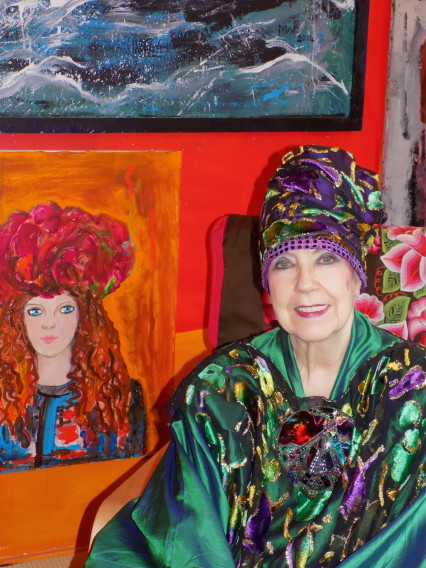
Though it is almost 28 years since Moll last took a drink, a decision that was taken almost instantaneously – ‘I was in the gutter, literally in the gutter, at Smithfield’s meat market, and my Granny’s voice came to me and said, “Time for you to stop now, bach. The party’s over for you” – it still does not take a huge stretch of the imagination to picture her holding court in the gin-sodden nicotine fug of The Colony Room and its associated Soho fleshpots. ‘Francis Bacon and I were as close as James and I were. Like James, we were cut from the same cloth. The response was the same. Kindred spirits attract each other. I value humour and I value honesty. I didn’t mind James’s hands being in my Marks & Spencer’s knickers, I didn’t find that strange because that’s how people often behave in posh restaurants. Francis was also a larger than life character and we knew each other inside out before we met, in a funny way. If you’re totally yourself and you have no pretences then you can’t really go wrong, can you? I was taught that by my grandfathers.’
‘What is it within me that seeks to disturb, and be thrown out?’ Moll asks at one point, before recalling a recent interaction with a female member of the Selfridges team who had blushed at the bawdy content of one of Moll’s poems. ‘She apologised to me for having such a reaction before conceding that it was her “ordinariness” coming out. I said, “Yes, it is. You want to have that looked at.”’ There is nothing of the ‘ordinary’ about Molly Parkin, a woman for whom even a perfunctory conversation about attempting to buy a clothes rail from the Chelsea department store Peter Jones becomes an elaborate exploration of social mores and self-deprecating humour. Seemingly, the notion of self-assembly furniture was not one that had previously encroached upon her sparklingly unique world, though ultimately – like most things in Molly Parkin’s life – the artist proved to be up to the challenge. On her own terms, of course, and with little recourse to the manufacturer’s instructions: ‘Oh, I don’t follow the directions, my darling. I never do that.’
Great Lives: Molly Parkin – dir. Robert Chilcott
In the second part of our revealing interview with Molly Parkin, the artist reflects upon the inescapable and destructive influence of her father, her frustrating relationship with the Welsh arts establishment, and a lengthy friendship with the writer Gwyn Thomas.
(Original artwork by Dean Lewis)





